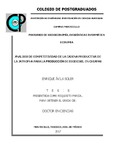| dc.contributor.author | Ávila Soler, Enrique | |
| dc.creator | ÁVILA SOLER, ENRIQUE; 360262 | |
| dc.date.accessioned | 2019-07-26T19:05:51Z | |
| dc.date.available | 2019-07-26T19:05:51Z | |
| dc.date.issued | 2017-03 | |
| dc.identifier.uri | http://hdl.handle.net/10521/3696 | |
| dc.description | Tesis (Doctorado en Ciencias, especialista en Economía).- Colegio de Postgraduados, 2017. | es_MX |
| dc.description.abstract | En el año 2010 se inauguraron dos plantas productoras de biodiesel a partir de jatropha en el Estado de Chiapas que fueron apoyadas por el programa estatal de desarrollo de biocombustibles para suministrar combustible al parque vehicular urbano. Se utilizó la Matriz de Análisis de Política para medir la competitividad y ventajas comparativas de la producción de jatropha en las fases agrícola e industrial para determinar si la cadena productiva de la jatropha es competitiva sin apoyo del gobierno. En la fase agrícola la MAP se realizó una proyección de 20 años, bajo las siguientes tecnologías: 1) monocultivo en los primeros cuatro años, 2) monocultivo a partir del quinto año y, 3) policultivo de jatropha-maíz-cacahuate en los primeros cuatro años. Los resultados de la fase agrícola indican que si la jatropha se produce como monocultivo en los primeros cuatro años los productores incurren en pérdidas por 5,050 $/ha, y solo a partir del quinto año obtienen ganancia por 14,719 $/ha. La relación beneficio-costo fue 0.92, 1.95 y 1.76 para las tecnologías 1, 2 y 3, esto indica que la producción de jatropha sólo es rentable en el largo plazo a partir del quinto año, y en los primeros cuatro años se debe producir asociada con maíz y cacahuate para evitar pérdidas. La producción de biodiesel es rentable en la fase industrial con una ganancia promedio por 3, 249,387 $/año. La relación beneficio-costo de la inversión resultó de 4.08 indicando una alta rentabilidad. La cadena productiva de jatropha en el estado de Chiapas es rentable, por lo tanto, se recomienda la implementación de acciones y estrategias que promuevan el crecimiento de esta actividad. _______________ ANALYSIS OF COMPETITIVENESS OF THE JATROPHA PRODUCTION CHAIN FOR THE PRODUCTION OF BIODIESEL IN CHIAPAS. ABSTRACT: In 2010, two production plants were open to produce biodiesel from jatropha in the state of Chiapas, which were supported by the state biofuel development program to supply fuel to the urban vehicular fleet. The Policy Analysis Matrix was used to measure the competitiveness and comparative advantages of jatropha production at the agricultural an industrial phase to determine if the jatropha productive chain is competitive without government support. In the agricultural phase the MAP was projected 20 years, under the following technologies: 1) monoculture in the first four years, 2) monoculture from the fifth year and 3) policulture of jatropha-corn-peanut in the first four years. The results of the agricultural phase indicate that if jatropha is produced as a monoculture in the first four years the producers have losses of $ 5,050 / ha, and only after the fifth year do they make a profit of $ 14,719 / ha. The benefit-cost ratio was 0.92, 1.95 and 1.76 for technologies 1, 2 and 3, this indicates that the production of jatropha is only profitable in the long term from the fifth year, and in the first four years it must be produced in policulture with maize and peanut to avoid losses. Biodiesel production is profitable at the industrial phase with an average profit of $ 3,249,387 / year. The cost-benefit ratio of the investment was 4.08, indicating a high profitability. The productive chain of jatropha in the state of Chiapas is profitable, therefore, the implementation of actions and strategies that promote the growth of this activity is recommended. | es_MX |
| dc.description.sponsorship | Consejo Nacional de Ciencia Tecnología (CONACyT). | es_MX |
| dc.format | pdf | es_MX |
| dc.language.iso | spa | es_MX |
| dc.rights.uri | http://creativecommons.org/licenses/by-nc-nd/4.0 | es_MX |
| dc.subject | Biodiesel | es_MX |
| dc.subject | Jatropha curcas | es_MX |
| dc.subject | Competitividad | es_MX |
| dc.subject | Ventajas comparativas | es_MX |
| dc.subject | Matriz de Análisis de Política | es_MX |
| dc.subject | Competitiveness | es_MX |
| dc.subject | Comparative advantages | es_MX |
| dc.subject | Policy Analysis Matrix | es_MX |
| dc.subject | Economía | es_MX |
| dc.subject | Doctorado | es_MX |
| dc.subject.classification | CIENCIAS AGROPECUARIAS Y BIOTECNOLOGÍA::CIENCIAS AGRARIAS::AGRONOMÍA::PRODUCCIÓN DE CULTIVOS | es_MX |
| dc.title | Análisis de competitividad de la cadena productiva de la jatropha para la producción de biodiesel en Chiapas. | es_MX |
| dc.type | Tesis | es_MX |
| Tesis.contributor.advisor | García Salazar, José Alberto | |
| Tesis.contributor.advisor | Valtierra Pacheco, Esteban | |
| Tesis.contributor.advisor | Romo Rico, Daniel | |
| Tesis.contributor.advisor | García Mata, Roberto | |
| Tesis.contributor.advisor | Hoyos Fernández, Gabriela | |
| Tesis.date.submitted | 2017-03 | |
| Tesis.date.accesioned | 2017 | |
| Tesis.date.available | 2017 | |
| Tesis.format.mimetype | pdf | es_MX |
| Tesis.format.extent | 1,673 KB | es_MX |
| Tesis.subject.nal | Jatropha | es_MX |
| Tesis.subject.nal | Biocombustibles | es_MX |
| Tesis.subject.nal | Biofuels | es_MX |
| Tesis.subject.nal | Cultivo continuo | es_MX |
| Tesis.subject.nal | Continuous cropping | es_MX |
| Tesis.subject.nal | Cadena de suministro | es_MX |
| Tesis.subject.nal | Supply chain | es_MX |
| Tesis.subject.nal | Precios de mercado | es_MX |
| Tesis.subject.nal | Market prices | es_MX |
| Tesis.subject.nal | Producción de cultivos | es_MX |
| Tesis.subject.nal | Crop production | es_MX |
| Tesis.subject.nal | Chiapas, México | es_MX |
| Tesis.rights | Acceso abierto | es_MX |
| Articulos.subject.classification | Energía biomásica | es_MX |
| dc.type.conacyt | doctoralThesis | es_MX |
| dc.identificator | 6||31||3103||310301 | es_MX |
| dc.contributor.director | GARCÍA SALAZAR, JOSÉ ALBERTO; 21083 | |
| dc.audience | generalPublic | es_MX |


